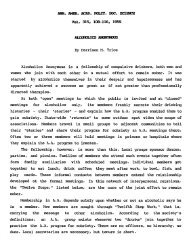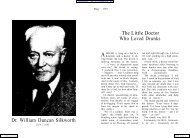alcoholics anonymous as a crisis cult - Silkworth.net
alcoholics anonymous as a crisis cult - Silkworth.net
alcoholics anonymous as a crisis cult - Silkworth.net
Create successful ePaper yourself
Turn your PDF publications into a flip-book with our unique Google optimized e-Paper software.
the descriptions of the initial AA contact reflect the relief feltin this discovery. One person said "I'd always been a stranger onearth, yearning to find someone who understood me. When I found AA,it felt like coming home to a loving family I'd never known."Having joined AA, the newcomer is no longer alone, and thatvery fact begins to engender self-respect, something he h<strong>as</strong> soughtfor a very long time. His total experience in AA works to reinforcea positive image. The very alcoholism that had alienated him fromsociety becomes the bond linking him to this loving primary group.Thus, his alcoholism is metamorphosed from a destructive force toperhaps the most positive identity he h<strong>as</strong> ever had.Total abstinence is the b<strong>as</strong>is of success in AA While somehighly contrived and, I think, inadequate research (Madsen,forthcoming) is trying to demonstrate that there is no compulsionin alcoholism (e.g., Sobell, Sobell, and Christelman 1972;Gottheil, Murphy, Skoloda, and Corbett 1972), the AA member "knows"that "one drink is too many and a thousand are not enough. " Despitethe opposition of some professionals in alcoholism, I find the AAposition obviously valid: The safest way to avoid alcoholicintoxication is to avoid alcohol.The switch from uncontrolled alcoholism to total abstinence isdr<strong>as</strong>tic, and the alcoholic person is struck dramatically by thequalitative difference in his life before and after affiliation. Inmany ways this before-and-after contr<strong>as</strong>t parallels the experienceof religious converts. Many AAers describe their drinking years <strong>as</strong>a period when they were controlled by destructive forces they couldnot identify. One AAer explained to me: "Back when I drank. I feltlike a puppet worked by an unknown m<strong>as</strong>ter who hated my guts. Everyworthwhile thing I tried he blocked by yanking on those lousystrings and getting me drunk." Other AAers visualize their drinkingyears <strong>as</strong> a period when an internal evil nature, aided by alcohol,dominated their real and good nature.The realization that he can live without alcohol comes <strong>as</strong> anenormous relief to the alcoholic person. As one primary alcoholicindividual said: "Every drinking bout w<strong>as</strong> like a game of Russianroulette,but I never really wanted to die or go mad. When I met AAand found that one can break away from drinking, I experiencedrapture. It w<strong>as</strong> too gorgeous to describe. I w<strong>as</strong> free!" The doubleelation of a new freedom combined with the satisfaction of thegroup bonding usually produces a period of euphoria, which AA callsa "pink cloud." On his pink cloud, the newcomer is safe fromalcoholic temptation. However, the euphoria will eventuallydissolve and the "AA honeymoon" will end. The newcomer must beindoctrinated with the AA principles before this happens or he willslip and be off on another drunken binge.Reliance on SponsorThe strongest insurance against such a slip is to tightlyintegrate the newcomer into the group. As a b<strong>as</strong>ic step, he is urgedto rely heavily on his sponsor - someone in the group whosesobriety is fairly long-term and who establishes a specialrelationship with the newcomer. The new member is also encouragedtc atter.6 meetings frequently, to read the literature, and to
socialize with AAers. He may also spend much time in so-called"dime therapy" - talking on the telephone with other AAers when hefeels anxious. If the indoctrination is successful, when a <strong>crisis</strong>comes, he turns to AA rather than to the bottle for help. That helpis always available without cost in AA.The ever available help and understanding incre<strong>as</strong>e thealcoholic person's sense of loyalty to AA. As a result, he findshimself living up to AA's expectations of him rather than yieldingto his own recurrent need for alcohol. His affiliation also helpshim resist the usual social pressures to drink. At the same time,AA's own folk psychotherapy remolds the entire value structure ofthe alcoholic person through the influence of his sponsor, and theeffect of attending AA meetings, and following AA's recommendedsteps to sobriety. The core of the person's being becomes the factof his alcoholism and his need to avoid alcohol. Every decision forthe rest of his life will be affected by this guidepost.In terms that must confuse the psychologist, AA also tells thealcoholic person to get rid of his ego while improving his selfconcept.In the jargon of AA, "ego" refers to the totallyfarfetched fant<strong>as</strong>ies of self-worth and future promise that gripmost alcoholic people between the periods of self-denigration. Thealcoholic person is urged to realize his own limitations and set upappropriate goals, rather than to strive for the unapproachableideals of total perfection. The blow of this so-called "egodestruction" is softened by the overt signs of approval from hisgroup <strong>as</strong> he progressively recognizes his fant<strong>as</strong>ies for what theyare and develops a more realistic image of his abilities andtalents. Further, through group support, he not only comes toaccept his potential realistically, but he also develops a positiveself-acceptance. With this new image he finds re<strong>as</strong>onable goals thathe can strive for without submitting to excessive stress. He learnsto seek serenity in his being and in his activities.However, primary alcoholism is by any definition a stressdise<strong>as</strong>e(Selye 1956) and its sufferers will forever experienceperiods of anxiety and despair. The psycho-physical syndrome ofanxiety in the primary alcoholic person is e<strong>as</strong>ily triggered, and hethen enters the psychic hell he once relieved by using alcohol. AAteaches him to hold onto his sobriety through these stressfulperiods with the knowledge that things will get better. It is atsuch times that the love, intensity, and tension-relieving laughterof an AA meeting are most effective.If despite these me<strong>as</strong>ures, the alcoholic person slips backinto drinking, he resigns from AA, but is always welcomed back whenhe again seeks sobriety. If he maintains his sobriety, he isrewarded by ever incre<strong>as</strong>ing prestige. Within AA he finds anintegrated value system and the personalized caring relations thattypify a folk society (Kroeber 1948). While his sobriety and selfconfidencegrow, he also learns to cope with the stresses of thelarger society in which he must live. As his time in the programincre<strong>as</strong>es, he finds that the rewards for a mature and responsiblelife, which AA calls a "good sobriety, " far outweigh those of a"bad sobriety" - which is seen <strong>as</strong> staying sober but failing toachieve personal growth.The sober alcoholic person securely in the AA mode becomes















